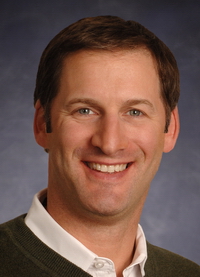Monday, February 4, 2008
Interview with Mark Solon, Highway 12 Ventures

Mark Solon is the managing partner of Highway 12 Ventures (www.highway12ventures.com), a venture capital firm headquartered in Boise, Idaho. The company currently manages two funds comprising more than $100 million. In November, it closed a second fund worth some $75 million and immediately began investing in startups throughout the Intermountain West. In late December, Highway 12 also hired two general partners (who, as of yet, remain unannounced) to assist Solon and General Partner Phil Reed. Techrockies' Holden Parrish conducted the interview.
What’s the story behind the Highway 12 name and how does it relate to what you’re trying to do as a venture capital firm?

Mark Solon: When I founded the firm, I was reading Undaunted Courage by Stephen Ambrose, which is about the Lewis and Clark Expedition. I was very inspired by what they had done and I wanted some connection to the Lewis and Clark story given that their experience in Idaho’s Bitterroot Mountains was their most challenging.
I didn’t want to be as egregious as to call it the “Meriwether Fund,” so I looked at a map and saw that Highway 12 literally parallels the Lewis and Clark trail across northern Idaho. That’s where the idea came from.
The parallel, of course, is today’s entrepreneurs, who are pioneers just like Lewis and Clark. They’re trailblazers, so there’s a strong connection between them, Lewis and Clark, and Highway 12.
You guys have been pretty busy lately—you’ve invested in three businesses since mid-November. What’s going on?
Mark Solon: We closed a second fund worth $75 million in November. We had 12 portfolio companies in the first fund, and we’re targeting 15-18 companies for the second fund.
Describe the ideal candidate for funding. What is Highway 12 looking for in a prospective business?
Mark Solon: I’m looking for a small, committed team of people who have consistently achieved extraordinary things, both personally and professionally. I think that good ideas are a commodity, and exceptional start-up teams are very rare.
In the almost 15 years that I’ve been investing in startup companies, I’ve rarely seen a company succeed that closely resembled its initial business plan. Startups need to be able to navigate many inevitable challenges. The problem is that you never know what those challenges are going to be. Whether it’s a large technology company that announces they are competing with you, whether it’s raising capital, or whether it’s a key member of the team leaving, the challenges are always there. It’s the ability to navigate and overcome the many challenges that startups face that give a company its greatest chance for success.
Also, we don’t look at micro-trends. We focus on macro-trends. Social-networking is a micro-trend. Health care is a macro-trend.
What are some of those trends you see right now?
Mark Solon: I think the two most exciting fields right now are health care/life sciences and alternative energy. With the aging of our Baby Boomers, which is a wealthy segment of the population that’s going to drive innovation across all facets, health care in general will be an exciting place to invest in during the next decade or two.
For me, the most exciting is alternative energy. Venture capital thrives when there’s a wave to be ridden. If you look at when the venture capital asset class has had exceptional returns, it’s when the industry has ridden a tsunami-like wave. In the ‘80s, it was the personal computer and the semiconductor chip. In the late ‘90s, it was the Internet.
I think, over time, alternative energy will be the wave that my industry rides. I also think alternative energy, if you look at all of the factors driving its research, such as global warming and our dependency on fossil fuels from the Middle East, that points to a lot of incentive to come up with alternative energy sources.
Venture capitalists create their returns on the backs of research, development and innovation. It’s a very benevolent cycle. Money sloshes around the globe looking for new ideas, and to drive big returns for your investors, you’ve got to invest that money in a market that’s exceptionally large. Well, creating alternative energy sources for our country and the world, whoever figures that out, they’re going to return great value to their investors.
There are going to be mutual winners in that space. That’s one of the reasons we’re so excited about M2E Power. That’s a world-changing technology.
Based on that, could one categorize Highway 12 as an alternative-energy focused firm?
Mark Solon: We are geographically focused, not vertically focused. Our investment thesis as a firm, the reason Highway 12 exists, is we believe there is unprecedented opportunity in the Intermountain West for startup companies. Three of the five fastest growing states in the country are in our target market.
Because we only invest in this region, we can’t afford the luxury of being vertically focused. We’re looking to invest in the best companies in the world at what they do. We believe a disproportionate amount of those companies will be in our four-state region, and we’re capitalizing on that.
We believe there’s sort of a supply-and-demand imbalance for capital in the region, and that results in good pricing. Here, we get a better price on our investment than in the Silicon Valley or in Seattle, where the supply-and-demand principle works the other way because there’s an abundance of capital but a lack of original ideas.
A few years ago, newspapers were reporting that Idaho’s future was so bright, Montana was going to have to ask Wyoming for sunscreen. Is the Gem State’s tech growth outlook still as promising?
Mark Solon: The press definitely made Boise out to be a future Silicon Valley. It’s a nascent market, and we wouldn’t have opened up a technology-focused venture capital firm in Boise if we didn’t think Boise held a lot of promise.
However, Idaho has a lot of work to catch up to its neighbors like Utah. Utah is truly an innovative, vibrant, technology-based economy that is generating a lot of buzz. As an example, the University of Utah spun out 17 technology companies last year. There’s true innovation happening there.
Boise is far behind. It’s nascent, but there’s certainly a lot of promise. There’s a lot of intellectual technology capital that resides in Idaho, but our state government has not been as supportive of building a sustainable infrastructure to support technology startups as our neighbors to the south.
There’s talk of recession. The Fed’s slashing rates, the Dow and NASDAQ indexes are sliding, the French can’t seem to keep track of their money—what sort of impact do these developments have on the VC side of things?
Mark Solon: There aren’t too many macro-economic forces that have a strong impact on what we do. Innovation doesn’t start and stop with economic cycles. The companies that we’re backing today, they won’t be maturing for five, six, seven years.
Sure, the general economy might have some impact on hiring, it might have some impact on customer buying, but we can control the expense lever at our portfolio companies to weather economic cycles. By and large, startups are more immune from economic cyclicality than a Fortune 500 company.
Thanks for your time and insights!